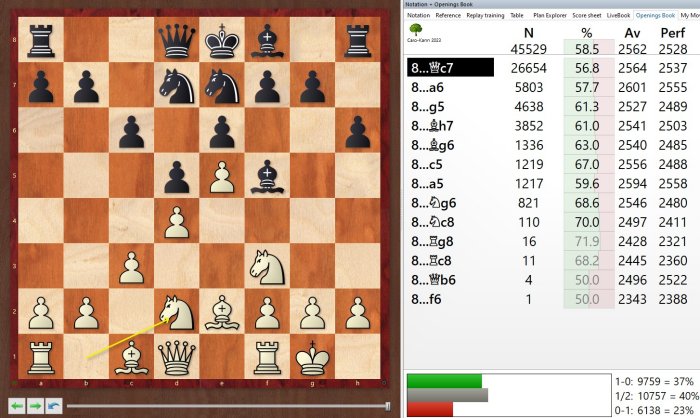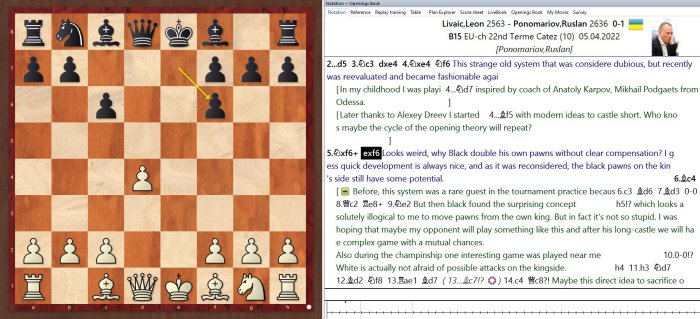Apart from todays hackneyed main lines (1.e4 c6 2.d4 d5 3.Nc3 and 3.e5), there are some other very interesting choices for White that each have their specific advantages and disadvantages. GM Daniel Fernandez is an expert using the Caro Kann for his own repertoire so he knows which systems can cause trouble for Black. In this video course he explains the ins out of his favourite systems. In modern times it gets more and more important to have several ways to counter an opening as you might want to surprise your opponent or even use different lines for different players or time controls. This video course is helpful to find the system that’s suits you best as White, but also for Caro-Kann players themselves as the author explains what are the best ways for Black to fight for equality.
Having enjoyed the videos, you can practice your freshly acquired repertoire in the Opening trainer. This will make sure you remember the important lines - and you’re well prepared to use them in your own games
Weapons against the Caro Kann Vol. 1: Panov and Two Knights
Apart from todays hackneyed main lines (1.e4 c6 2.d4 d5 3.Nc3 and 3.e5), there are some other very interesting choices for White that each have their specific advantages and disadvantages. GM Daniel Fernandez is an expert using the Caro Kann for his own repertoire so he knows which systems can cause trouble for Black. In this video course he explains the ins out of his favourite systems. In modern times it gets more and more important to have several ways to counter an opening as you might want to surprise your opponent or even use different lines for different players or time controls. This video course is helpful to find the system that’s suits you best as White, but also for Caro-Kann players themselves as the author explains what are the best ways for Black to fight for equality.
Having enjoyed the videos, you can practice your freshly acquired repertoire in the Opening trainer. This will make sure you remember the important lines - and you’re well prepared to use them in your own games
- Video running time: 4 hours 03 min.
- Extra: Training with ChessBase apps – Memorize the opening repertoire and play key positions against Fritz on various level
- Including download & stream for iPad, tablet etc: can be unlocked with imprinted key
Weapons against the Caro Kann Vol. 2
The Caro-Kann Defence is very popular and as a 1.e4 player you definitely need a strong weapon against this solid and yet dangerous opening. Apart from todays hackneyed main lines (1.e4 c6 2.d4 d5 3.Nc3 and 3.e5), there are some other very interesting choices for White that each have their specific advantages and disadvantages. GM Daniel Fernandez is an expert using the Caro Kann for his own repertoire so he knows which systems can cause trouble for Black. In this video course he explains the ins out of his favourite systems
In modern times it gets more and more important to have several ways to counter an opening as you might want to surprise your opponent or even use different lines for different players or time controls. This video course is helpful to find the system that’s suits you best as White, but also for Caro-Kann players themselves as the author explains what are the best ways for Black to fight for equality. Having enjoyed the videos, you can practice your freshly acquired repertoire in the Opening trainer. This will make sure you remember the important lines - and you’re well prepared to use them in your own games
Video running time:
- 4 hours 44 min.
- Extra: Training with ChessBase apps – Memorize the opening repertoire and play key positions against Fritz on various level
- Including download & stream for iPad, tablet etc: can be unlocked with imprinted key
Caro-Kann Powerbook 2023
For the Caro-Kann Powerbook an Elo average of at least 2375 was set. Thus 69 000 games from Mega and from correspondence chess met the threshold for the Powerbook, to which were added 755 000 games from the engine room of playchess.com. The Caro-Kann is considered a safe opening, since it is very rare for Black to have to put up with a compromised pawn structure. Nowadays there is quite a different way of playing the Caro-Kann. This is also reflected in the Powerbook. After 1.e4 c6 2.d4 d5 the main continuation is no longer 3.Nc3 dxe4, but quite clearly 3.e5 Bf5 4.Nf3 – with statistics based on more than 183 000 games. The amount of theory has grown enormously and the Powerbook offers several interesting approaches in the search for promising side variations. An especially popular one is in the Two Knights Variation 2.Nf3 d5 3.Nc3, but also in the Exchange Variation 2.d4 d5 3.exd5 cxd5 4.Bd3 there has been a surprising renaissance in recent years.
After the most frequently played moves 3.e5 Bf5 4.Nf3 e6 5.Be2 Nd7 6.0-0 Black has a wide choice although some moves lead to the same position with different move orders. Probably the critical move is 6...Ne7 and it appears that the Powerbook continues by a wide margin with 7.c3, whereas in human chess the c-pawn move has no great part to play (with first 6...h6 the same is true for 7.c3). After 7...h6 8.Nbd2

We still have in the Powerbook more than 45 000 games, the online database having only 650, with very few of these games by the world’s top players, and those all in blitz or rapid chess. Moreover the statistics are not bad for White – a good opportunity for you to get ahead of the competition.
Caro-Kann Powerbase 2023
The 781 selected annotated games offer outstanding material for study. Players such as Carlsen (1 annotated game), Andreikin (5), Anand (2), Adams (2), Duda (1), Eljanov (3), Firouzja (1), Gashimov (2), Giri (2), Harikrishna (1), Karjakin (1), Kasimdzhanov (3), Navara (2), Nepomniachtchi (1), Polgar (1), Radjabov (1), Wojtaszek (1) have analysed their games, with in addition Caro-Kann experts like Lukacs (361), Postny (48), Sumets (30) and Roiz (21). In all there are 10974 games where the average rating is at least 2585 (except for the annotated games and games by the specialists).

The database loads the games list. A double click loads a game. By using the Players tab you can sort the games according to frequency. This lets you take a closer look at players such as Alexey Dreev and Rasmus Svane (experts with the black pieces) or Baadur Jobava and Anatoly Karpov (both colours).

The games can be played through or further investigated with an engine or a Powerbook.




